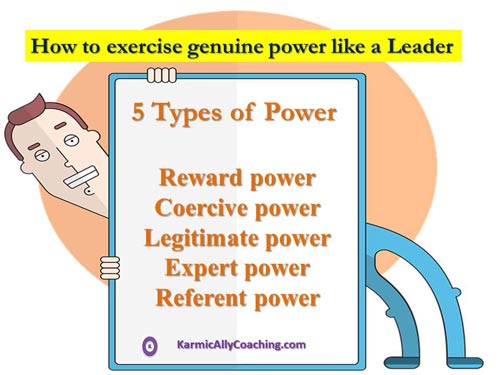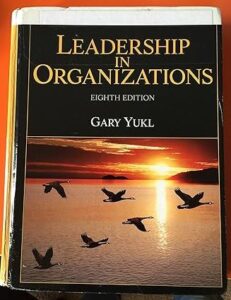This post has already been read 7932 times!

Did you know you have the ability to exercise power in the workplace like a Leader, even if you aren’t the boss?
This point came up during a coaching session with a client who is being groomed for a Leadership role. Anita (name changed) was given the task of motivating professionals in her organization to attend critical compliance and methodology training sessions during the Christmas season and early January this year.
These training sessions were being recorded but the Higher Ups wanted more live attendance and audience participation.
Her concerns were genuine because none of the targeted attendees were working for her. Her sphere of control over this matter was limited.
How was she going to get attendance compliance from this targeted audience?
What she didn’t know was that power doesn’t only come from position. There are other types of power that can be exercised to achieve the end objective while demonstrating leadership skills.
5 bases of Power and their Source

John French and Bertram Raven identified 5 bases of power in the early 1960’s through a study they had conducted on power in leadership roles. The study showed how different types of power affected one’s leadership ability and success in a leadership role. For the purposes of explanation, the person exercising power is referred to as the agent.
The 5 bases of power are divided into two categories:
Formal Power
Coercive Power is gotten through threatening others. The target person complies in order to avoid punishments he or she believes are controlled by the agent. It is conveyed through fear of losing one’s job, being passed up for a promotion or being deprived of an assignment that is given to another colleague.
Reward Power where employees are rewarded for compliance with one’s wishes. The target person complies in order to obtain rewards he or she believes are controlled by the agent. It is conveyed by giving time off, bonuses, promotions or even a complimentary meal at a tony restaurant.
In my post on the antics of Big Brother Cat’s style of leadership, the Manager used both these forms of power – coercive to get the job done under pressure and then turning to reward power as a treat for the team. A strange combination because it sent out mixed messages to the team and undermined his true power potential as a leader.
Legitimate power comes from a position in the organization such as being a team leader or head of department. The target person complies because he or she believes the agent has the right to make the request and the target person has the obligation to comply. The agent’s authority isn’t questioned.
Informal or Personal Power
Expert Power comes from one’s skills, experience or knowledge. The target person complies because he or she believes that the agent has special knowledge about the best way to do something. This was the power that I exercised during the assignment where Big Brother Cat treated us live galley slaves. As the Technical Manager, I had the expertise knowledge and skills to lead the team.
Referent Power comes from being trusted and respected. The target person complies because he or she admires or identifies with the agent and wants to gain the agent’s approval. We gain this power when we show others that we are worthy of trust and are the situational leader. Referent Power acts a little like role model power. It depends on holding the other person in high esteem and usually develops over time.
How to use your power with peers & subordinates

In any situation where power is exercised, there can be 1 of 3 objective outcomes – commitment (to do the task), compliance with the order or resistance to the task.
Gary A Yukl in his book Leadership in Organizations (1989) used the power bases identified by French and Raven and based on further research, developed guidelines for influencing others. While the guidelines address leader influence attempts with subordinates, the principles’ underlying these guidelines apply equally well to influence attempts with peers as well as with superiors.
According to his research, the two types of power most likely to produce compliance are legitimate or position power and reward power.
In the context of legitimate power, authority should be exercised in clear and concise written or verbal format using language that is understood by the target. A polite request will achieve the desired compliance compared to an arrogant demand. It’s important that the request be perceived as being within the scope of the requester’s authority.
Coming back to Anita, as the driver of the training sessions, she had the legitimate power to request the Managers to instruct their subordinates to commit to attending the training sessions.
However, that wasn’t enough. The request had to outline the benefits of the training as well as provide some incentive to the attendees.
This is where Reward Power came into the picture.
The reward had to be something that held intrinsic value for the target person. In this case, since she was dealing with professionals who had to demonstrate Continuing Professional Development practice, the live attendees were promised points that would count towards their professional education. They were also given a certificate of attendance or completion of training.
Commitment of the Managers and their teams was also required.
Clearly my client had to exercise more of her personal or informal power to achieve the compliance objective of getting her colleagues to attend the training.
Fortunately, she was the facilitator of the trainings and has over the years, built up her network within the organization and developed her Executive Presence. This gave her Referent Power to request her peers to attend the training with their teams.
By the time the first batch of training was completed, she had established her Expert Power with those attendees who didn’t know her from before.
The rest of her sessions went well and she received appreciative feedback with requests for more training on specific topics.
The reason I’ve shared my client Anita’s case study with you is to demonstrate that you don’t have to be a leader or in a senior position in an organization to have power.
In fact the most respect is garnered by those who have personal sources of power. When employees associate power with expert or referent, they are more engaged and willing to go the extra mile for the organization’s goals.
Which type of power do you exercise with your colleagues and subordinates to achieve your organization’s goals?
I’d love to read about them in the comments box below.
Additional Resources on Leadership Power:
French & B.H. Raven, Studies of Social Power, Institute for Social Research, Ann Arbor, MI (1959).
French and Raven’s bases of power
Leadership in Organizations (8th Edition)
Also available on Amazon India
Influence is the Value Force Of Leadership
Developing Leadership Guide and Planner





 I adhere to the Certified Coaches Alliance Code of Ethics and Standards. A copy is available on request.
I adhere to the Certified Coaches Alliance Code of Ethics and Standards. A copy is available on request.
 Let's Talk through the Connect Form:
Let's Talk through the Connect Form:
You do a superb job os synthesizing information of leadership and providing information so that a wider audience can understand themselves as having power and exercising power in many situations. We are all powerful, but most of us have not been given the tools to analyze what choices we have and how we influence others. I commend you on this thoughtful post.
Thank you Meghan for inspiring me to share more knowledge!
This is such an interesting article Vatsala. Thank you!
My pleasure Zeenat. Delighted you enjoyed reading it.
Great article, Vatsala. I enjoyed reading your insights. You share valuable and helpful information for leaders on all levels.
Thank You Cindy!
I absolutely love that quote by John Quincy Adams and photo. It deeply resonates. I have the ability to keep others inspired and enlightened to lead them into a better way of life. For that I am grateful.
Inspiring others to achieve their true potential is a gift and the ability to do it is a blessing, Heather. I love John Quincy Adams’s quote too!
Grateful that I am retired now from the working world but wish I would have had this info way back when I was working. Lots of great advice here.
Thank you Barb, you’ve made my day!